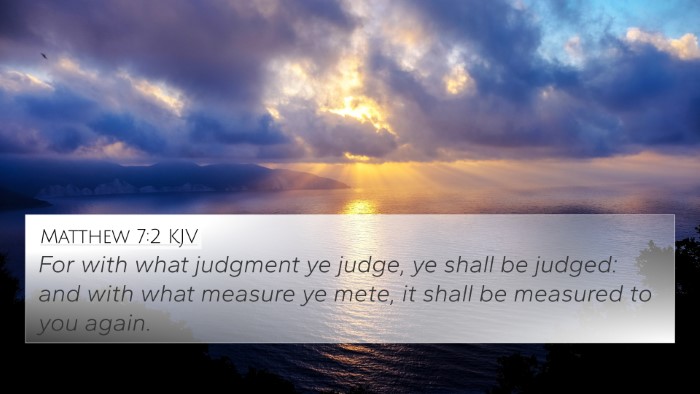Understanding Judges 9:23
Judges 9:23 states: "Then God sent an evil spirit between Abimelech and the men of Shechem, and the men of Shechem dealt treacherously with Abimelech." This verse alludes to the divine action that intervenes in human affairs, revealing themes of justice and retribution that are prominent throughout scripture.
Verse Meaning and Context
In the Book of Judges, we observe a cyclical pattern of sin, punishment, repentance, and deliverance. Abimelech's rise to power is marked by treachery, notably his fratricide, and God’s judgment ultimately results in discord among his allies, as illustrated in this verse.
Commentary Insights
-
Matthew Henry's Commentary:
Matthew Henry interprets this verse as God’s providence in action. He notes that the evil spirit sent by God illustrates divine sovereignty in manipulating human hearts and relationships to fulfill divine justice.
-
Albert Barnes' Notes on the Bible:
Barnes emphasizes the significance of the "evil spirit" as reflecting God’s disapproval of Abimelech’s actions and his subsequent punishment. He argues that this serves as a warning against pride and ambition that rise at the expense of moral integrity.
-
Adam Clarke's Commentary:
Clarke highlights the moral decay among the men of Shechem, suggesting that their treachery was both a punishment for their previous actions and a fulfillment of divine judgment. The spirit of discord validates the ancient principle of "what a man sows, that shall he also reap."
Thematic Connections
This verse embodies numerous themes including:
- Divine Justice: The action of sending an evil spirit represents a form of divine retribution.
- Moral Consequences: The treachery exhibited by the Shechemites highlights the destructive nature of sin.
- Intervention of God: God's direct involvement in humanity's affairs underscores His sovereignty over good and evil.
Bible Verse Cross-References
To gain a fuller understanding of Judges 9:23, consider the following cross-references:
- 1 Samuel 16:14 - Senf of an evil spirit from the Lord troubling Saul.
- Proverbs 16:7 - When a man's ways please the Lord, He makes even his enemies to be at peace with him.
- Galatians 6:7 - A man reaps what he sows, reinforcing the theme of moral consequence.
- Romans 1:18-32 - The wrath of God is revealed against ungodliness, connecting with divine judgment.
- James 4:1-2 - Conflicts arising from desires that battle within, reflecting the discord among Shechem's men.
- Isaiah 19:2 - God stirring up strife between men, demonstrating the theme of divine intervention.
- 2 Corinthians 5:10 - We must all appear before the judgment seat of Christ, linking judgment to individual actions.
Connecting Old and New Testament Themes
Judges 9:23 serves as a powerful hinge between Old Testament narratives and New Testament teachings. The principles of justice and divine sovereignty resonate through the ages, shaping theological discussions. The evil spirit's mission aligns with the New Testament's emphasis on spiritual warfare and the realities of the unseen world.
Using Cross-References for Deeper Study
For those looking to delve into comprehensive Bible study, employing tools for Bible cross-referencing enhances understanding:
- Bible Concordance: Useful for locating specific words and concepts across scripture.
- Bible Cross-Reference Guides: These tools aid in linking related texts and uncovering deeper meanings.
- Cross-Reference Bible Study: Helps in thematic studies and understanding scriptural context.
- Bible Reference Resources: Explore relationship dynamics between texts across scripture.
Conclusion
Judges 9:23 reflects profound truths about the nature of God and the consequences of human actions. The insights provided by historical commentaries reveal a multifaceted understanding of the text, encouraging further exploration of God's overarching narrative throughout scripture. By utilizing the listed cross-references and tools, readers can gain a more robust understanding of Judges 9:23 and its place in the biblical canon.















